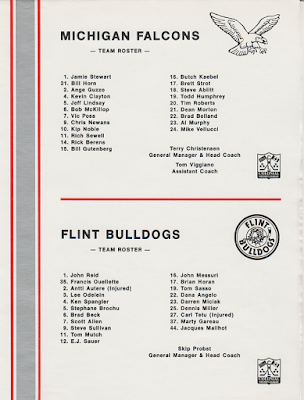 |
| 1991-92 Regular Season Falcons vs. Flint Bulldogs |
The Colonial Hockey League was founded in 1991 by former Peoria Rivermen GM Leslie "Skip" Probst. The league was an independent "Double A" circuit based in Michigan and Ontario. The five teams making up the league in the inaugural 1991-92 season included:
The Michigan Falcons were based out of Fraser Ice Arena and were owned by Mostafa Afr, a certified public accountant in Oak Park. The team's original colors were black, silver and white. The jerseys were similar to the Los Angeles Kings jerseys of the time, with the Falcon logo and the word "FALCONS" on the crest. Afr hired MSU assistant Terry Christiansen as the team's first General Manager/Head Coach. Tom Viggiano was his assistant coach.
The Falcons had a fine inaugural season, capturing the regular season championship with a 34-22-4 record. Their 75 points were three ahead of second-place Brantford. Michigan scored the third most goals in the Colonial Hockey League with 296. Their leading scorer was Clayton Young, who came over from Greensboro of the ECHL. Young scored 35 goals and 88 points in 53 games, which placed him fifth overall in the league. Bob McKillop, who would go on to play most of his career with the Falcons, led the team with 40 goals (fourth-most in the league), while right wing Brett Strot was right behind with 38.
The Falcons had the top defense in the league, allowing just 257 goals. The team just used two netminders that season, a rarity in the low minors. The main netminder was Bill Horn, a Western Michigan alum and a 5th round pick of the Hartford Whalers in 1986. Horn played in 43 games, sporting a 20-13-3 record with a 4.05 GAA and 1 shutout. His backup was rookie Jamie Stewart, a former Michigan State netminder. Stewart went 14-9-1 with a 4.35 GAA and 1 shutout. Both goalies played in the playoffs.
Having finished first overall, the Falcons were one of the favorites in the first Colonial Cup Playoff tournament. They drew the St. Thomas Wildcats, who finished in fourth place with a mediocre 24-29-7 record. However, the Wildcats, coached by former Flint Generals captain Peter Horachek, upset the Falcons in six games to advance to the Colonial Cup Finals. The Wildcats faced the Thunder Bay Thunder Hawks, and battled in a classic seven-game series, won by Thunder Bay in overtime in Game 7.
I went to a lot of Detroit Falcons games over the years, but not during this season. I've only seen two Michigan Falcons programs, and got this one for Christmas. This is a 27-page program, all in black-and-white, on glossy paper. There are biographies of the ownership group, the front office and coaching staff. Defensemen Al Murphy and Jeff Lindsay have full page bios in the middle of the program. Murphy would spend just one season in the Colonial League, moving on to the Central League and West Coast Hockey League after 1991-92. Lindsay would leave Fraser and play the next five seasons in England in the British Hockey League. He would return to the league with the UHL's Knoxville Speed for 2 games in 2000-01.
Local advertisements include Marinelli's Bar and Grill, Play It Again Sports, Roger's Roost and the Flint 4 Seasons Sport Center. The last page of the program includes a souvenir order form. Prices range from $2 pucks to $45 replica jerseys.
Pages 25-26 has pictures of each player on the Falcons, as well as Coach/GM Christiansen and assistant coaches Viggiano and Ray DeGrendel. The Falcons roster included former Hartford Whaler Mike Vellucci (2 games), former Saginaw General Vic Posa, and former Detroit Red Wing Dean Morton (1 game).


Comments
Post a Comment